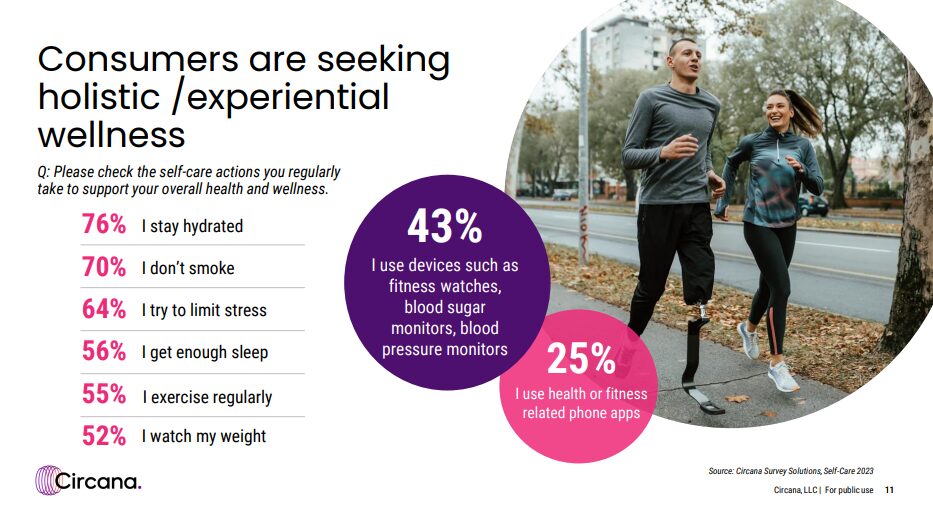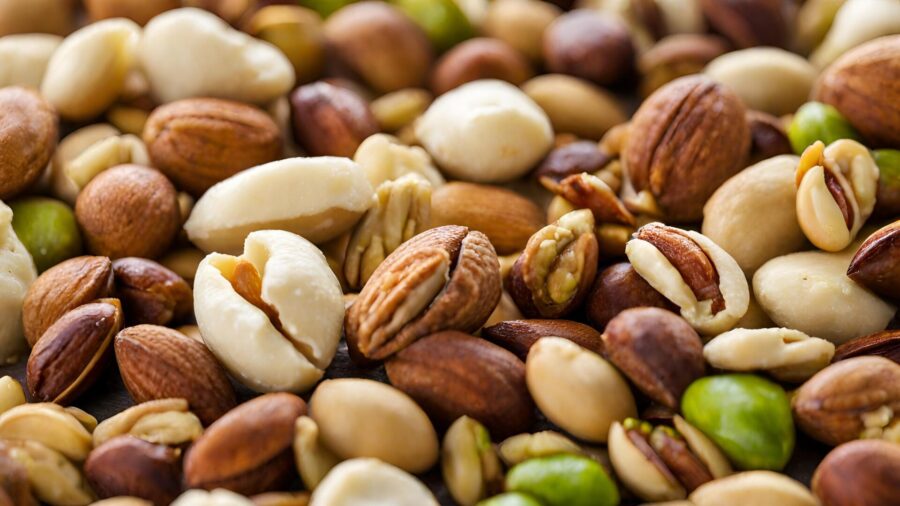We live in the future.
From GLP-1 injectables like Ozempic and Wegovy to mushroom-based coffee alternatives and berberine-infused appetite suppressants, nutrition has never been easier to manipulate. Using mostly natural ingredients derived from the earth and delivered to consumers’ doorsteps via direct ship or simply over-the-counter purchases at pharmacies large and small, supplements aren’t just replacing what was previously achieved with an ascetic diet and vigorous exercise – they’re completely changing consumers’ morning, day, and evening habits regarding what they eat, how they eat, when they eat, and how much they eat. Health can be ingested with a glass of water or dissolved in a shake.
Retailers’ pharmaceutical sections have grown in leaps and bounds to cover entire warehouse aisles with gel-capped multivitamins popped from pill packets; clear plastic jars brimming with magnesium, B vitamins, and ashwagandha or kratom; and great barrels of protein and creatine. Most anyone can get what they want when they want it to achieve X, Y, or Z – or all three – with their bodies, minds, and overall health and nutrition.
The brain health supplement category is expected to reach $1.4 billion this year with an estimated $420 million of additional growth by 2026. Mood and mental health growth has also strengthened as consumers more than ever hope to augment their emotional states with over-the-counter and prescription health supplements; the mood and mental health segment is growing at a CAGR of 3.7% until 2027 to an estimated $1.5 billion in sales. Protein supplements lead the market with 14% growth year-over-year.
According to recent data from Brightfield group, multivitamins and Vitamin D and C are the top three most-purchased supplements since Q1 2023:
- Multivitamins – 26.1%
- Vitamin D – 25.5%
- Vitamin C – 22.0%
- B-12 – 15.3%
- Fish Oil / Omega 3s – 14.0%
Calcium, magnesium, probiotics/prebiotics, melatonin, and zinc round out the top 10.
According to the recent Circana report, “Examine the Self-Care Opportunity,” 78% of consumers actively practice self care and that it’s a bigger deal across the spectrum since the pandemic. Americans are most interested in improving physical health (49%), reducing stress and anxiety (35%), and proactively managing weight (also 35%).
Older consumers tend to rely on medical professionals for self-care information, while younger generations turn to family and friends. For Gen Z, TikTok is the no. 1 resource for self-care inspiration while millennials turn to Instagram. Gen X and baby boomers prefer Facebook.
One Supplement to Rule Them All: Magnesium
Magnesium outpaces most of the competition in terms of new adoption among consumers. According to Data Horizzon Research, the magnesium market is valued around $1.6 billion today and growing at a CAGR of 6.3% to almost $3 billion by 2032.
Primarily distilled into a powder form, magnesium is an essential mineral that must be obtained via diet as the body doesn’t produce it. Magnesium can offer many benefits including increased muscular function, neuronal transmission, energy metabolism, and bone health. Typically found in beans, vegetables, and seeds, magnesium also promotes healthy blood sugar regulation, may reduce stress and improve headaches, and can help overcome symptoms of anxiety and depression while also promoting sleep.
Magnesium typically falls into three supplemental forms:
- Magnesium oxide: used to help treat magnesium deficiency or constipation
- Magnesium citrate: a laxative that can help with occasional constipation
- Magnesium chloride: used to boost magnesium levels and may help treat other conditions, such as prediabetes
Functional Food Complements Supplements
Per the Circana report, functional food nutrition is also undergoing a radical transformation as more consumers look for outsize benefits from what they put on their plates. Just under half of all Americans surveyed by Circana say food is as important as medicine, and that number appears poised to grow. High sources of protein, energy-giving, and high calcium claims have fueled this field to new heights as consumers approach $1 billion of spending on high-protein food annually.
Jay Schafer is the founder & CEO of Zurvita and shares five powerful components revolutionizing functional food nutrition:
Stabilized Rice Bran: A natural nutritional powerhouse packed with fiber, vitamins, minerals, amino acids, and over 100 plant antioxidants. It also provides a wide spectrum of nutritional elements, oils, fibers, proteins, and other micronutrients. With the addition of Gamma Oryzanol, a naturally occurring element in whole rice bran, the health benefits are extended to cardiovascular health, cognitive function, and immunity at all life stages.
Botanicals: Botanicals are ingredients from plant sources (including herbs and berries) that provide numerous healthy benefits for the body. Key botanicals include but are not limited to Acai Berry Powder, Ashwagandha Powder, Chlorella Powder, and Goji Berry Extract.These wide-ranging benefits include support for circulation, immunity, digestive function, and so much more.
Vitamins: Vitamins are essential nutrients we require from our diet for good health and address stress, energy, mood, strength, and overall health. Look for some of the essentials such as the B Vitamins, C, D, E, and Vitamin A.
Essential Minerals: Like vitamins, minerals are crucial for good health and must be derived from our diets. Look for minerals such as iron, magnesium, manganese, phosphorus, potassium, iron and zinc. The benefits from these essential minerals have far-reaching positive effects for all parts of the body and support many functions, including cardiovascular, nerve, and muscle function and immune health.
Amino Acids: These are the building blocks of protein, enzymes, and hormones and are crucial to helping the body maintain optimal health by ensuring the storage of nutrients such as carbohydrates, minerals, vitamins, proteins, fats, and water.
The Food Institute Podcast
How does one jump from aerospace engineering into plant-based chicken nugget production? That’s exactly the leap that Christie Lagally, CEO & Founder of Rebellyous Foods, took in search of producing a healthier chicken nugget. Learn more about her company’s focus on animal welfare, environmental sustainability, and human health in this episode of The Food Institute Podcast.














